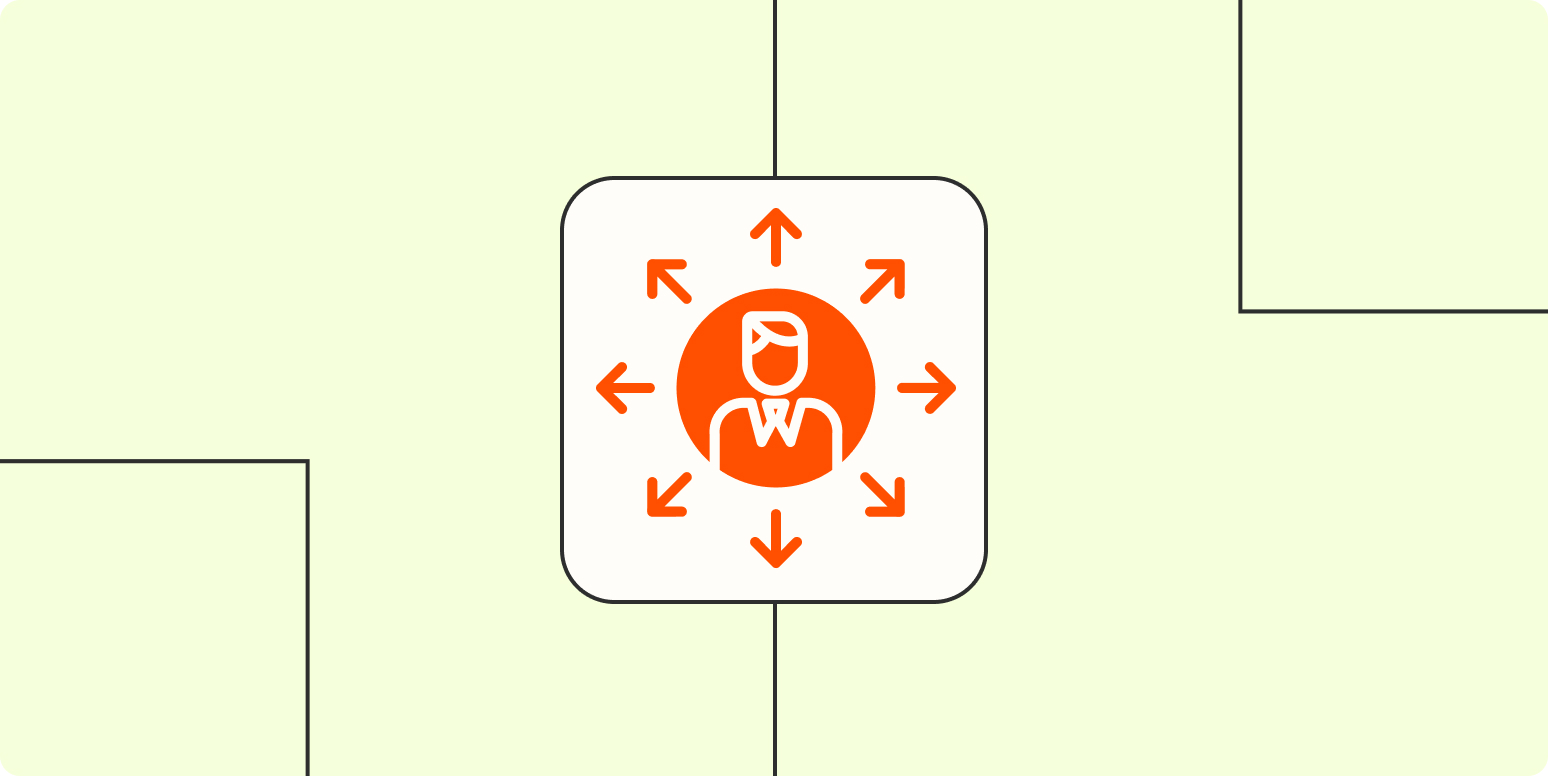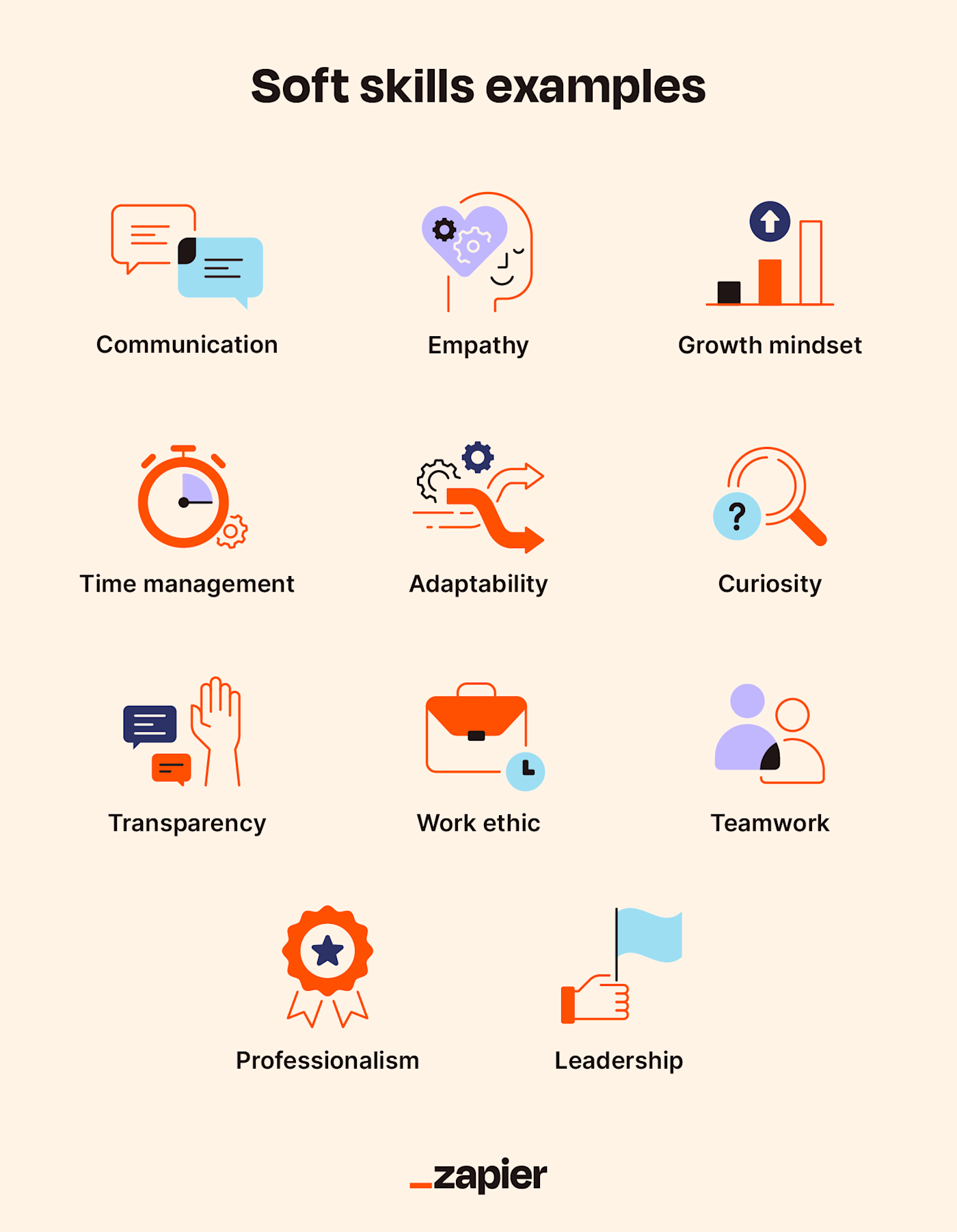44 Soft Skills Examples to Advance Your Career

Metadata
- Author: zapier.com
- Full Title: 44 Soft Skills Examples to Advance Your Career
- Category:articles
- Published Date: 2022-10-31
- Summary: Looking to make yourself a more valuable worker? Check out these soft skills examples, definitions, and tips for adding soft skills to your resume.
- URL: https://zapier.com/blog/soft-skills-examples/?ref=refind&utm_source=google&utm_medium=cpc&utm_campaign=gaw-gbl-nua-search-blog-dsa&utm_adgroup=DSA-BestApps-Form_Builder&utm_term=&utm_content=_pcrid_659058345737_pkw__pmt__pdv_c_slid__pgrid_157760468828_ptaid_dsa-2066874513104_&gad=1
Highlights
- You can’t entirely separate your job performance from who you are outside of work, and you shouldn’t have to. (View Highlight)
- Soft skills are personal strengths that help you collaborate, lead, create, and grow in your role. They’re the perspectives, reactions, and mental frameworks you use that aren’t exclusive to your job. (View Highlight)
- You can’t be successful in a job without soft skills. (View Highlight)
- No matter how much you’ve honed your craft, it’s nothing without soft skills to support it. (View Highlight)
- While hard skills refer to the technical abilities you’ve acquired through some sort of training, education, or experience, soft skills are the less tangible personal qualities that help you succeed on the job. (View Highlight)
- If hard skills are the base of your career pizza, soft skills are all the delicious toppings (and yes, that includes pineapple). (View Highlight)
- Note: This is an interesting mental model. Maybe I can illustrate or design is sometime and share it on Instagram.
- Collaboration without communication is impossible. (View Highlight)
- Note: This explains why I hated working with Imman so much – because he was extremely difficult to communicate with.
- What does it mean to be an effective communicator, though? Everyone has different preferences, so part of the skill is being able to adapt your communication skills to the environment. How you speak to a strategic partner will be different from how you speak to your peer, for example. It’s all about reading the room. (View Highlight)
- Note: Speaking to someone I could potentially collaborate with should be different from the way I communicate with other, more casual peers.
-
”I can’t count how many presentations I watch in interviews that set up 10-15 minutes of context in a 25-minute presentation before giving any important information. Business communications isn’t telling a narrative like literature or academic writing with context > argument > big reveal. You have to state the most important conclusion in the first minute/slide/paragraph. Then rebuild the narrative and justification.” (View Highlight)
- Note: A quote from Stephen Levin, Head of Business Operations at Zapier.
-
”Discussing a subject directly rather than skirting it is essential in time-sensitive situations when an urgent response is required. A poor communicator will slow down your process and cause you to waste time.” (View Highlight)
- Note: A quote from Nick Polyushkin, the co-founder of Ofirio.
- Being able to communicate effectively in writing—in a concise, clear, and engaging way—is a huge boon in a professional setting. (View Highlight)
- Note: A ‘boon’ is something that’s helpful or beneficial.
- While you may never need to deliver an organization-wide motivational speech, being able to confidently lead a presentation or speak on a call is an important skill, whether you interact with customers and clients or just your coworkers. (View Highlight)
- Note: This is perhaps the very thing I sucked at during my stint as a designer. I can still vastly improve my communication skills, and I’ve been thinking of ways to do it. A few ideas include starting a podcast or content creation. Some even include me speaking to the camera every day for a number of days. Though that’s something I should reflect on before I start, because one of my values is commitment. Once I do it, I will commit. No ifs, no buts – full on commitment.
- A growth mindset views failure as a catalyst for improvement, not as a personality trait. And while getting constructive feedback might sting, it’s how you react to it—and learn from it—that will make or break your success at work. (View Highlight)
- If you’ve got your eye on that corporate ladder, you’re going to have to produce some results. Even if the results aren’t what you’d expected, showing that you’re learning from them is just as good. (View Highlight)
- If you can set your own relevant goals and develop a plan to achieve them, you’ll always stay a step ahead. (View Highlight)
- You can’t be put on a PIP if you put yourself on one first. (View Highlight)
- Note: In the workplace, ‘PIP’ means Performance Improvement Plan.
- I know this sounds like something a high schooler would say when applying for their first job, but let’s face it: most adults also have trouble managing their time. (View Highlight)
- Note: This is really interesting. Did it make me sound childish when I got into the interview for Hatch?
- Instead of a broad “time management” soft skill, you can break this one down further to be able to demonstrate how you manage your time. For example: • Determine when and how you work best • Focus by eliminating distractions • Track your time to better understand effort versus impact • Automate tedious tasks so you can focus on important work (View Highlight)
- “There will always be a few things going on at once, and it’s important to prioritize the most important tasks without sacrificing work on the others as well. With good time management, you can split your time wisely between tasks and not drop the ball.” (View Highlight)
- Note: A quote from Mark Pierce, CEO of Cloud Peak Law Group.
- Clean up your work, so you can boost your productivity and improve your time management. (View Highlight)
 (View Highlight)
(View Highlight)- When you’re presented with change, do you lean into it, or do you go into it kicking and screaming? Being able to go into new situations with an open mind shows that you’re open to growth. (View Highlight)
- Note: Changes don’t have to be scary. Adaptability and open-mindedness are key!
- Employers understand that you can’t possibly know everything going into a job. As long as you’re willing and able to learn, you’re an asset. (View Highlight)
- Note: This is something I have to consider, especially in the future of my career when I would be looking at the internships of FSGC.
- If you find a process that could be better, do you scramble to your boss for a solution, or do you brainstorm a way to improve it yourself? (View Highlight)
- Note: I usually just suggest the solution to my boss or manager (Daqui and/or Krissie in this case, sometimes my superiors like Jess and Carl, and Migs), and it’s been good so far. I feel as if I have been innovative and helpful to the company in myriad ways.
- Work ethic is a broad term, but it boils down to doing your job consistently and doing it well. This soft skill reflects an individual’s commitment to their job and their ability to produce quality work. (View Highlight)
- Aim to be someone your team can rely on to get things done on time—and done well. Just be sure you don’t overdo it and end up taking on more work than you can manage. (View Highlight)
- Lending a hand even when you haven’t been asked to will make you a standout team player. (View Highlight)
- Note: Maybe? In some cases, yes. In some cases, no. I just feel like autonomy is more important when it comes to group work, but at the same time I understand the value of collaboration. But there’s a fine line between collaboration and loss of autonomy, and I hate the latter. I like a balance of both.
- How do you present yourself to your colleagues or clients? For some, this might mean throwing on a blazer, and for others, it might mean bringing your emoji usage down 20%. (View Highlight)
- Note: For me, I think building a personal brand is best.
- ”Professionalism is vital as it sets the tone for how employees represent themselves and the company. Candidates with professional demeanor can help build trust and credibility with clients, customers, and colleagues.” (View Highlight)
- Note: A quote from Yamini Rai, a soft skills trainer and HR head at The Viral Pink.
- Nobody likes that one coworker who’s always complaining that they’d rather be sipping a piña colada in the tropics right now. (View Highlight)
- Note: This reminds me of a co-worker – someone who complains a lot. It explains why I don’t like him very much, but at the same time I’m keeping my boundaries healthy – that means it’s alright to work with him, so long as he doesn’t go beyond the limits I set. There’s such a thing as “too much,” and I don’t want to experience that from anyone.
- Mind your P’s and Q’s (View Highlight)
- Note: This is an english expression meaning, “Mind your manners.”
- Talk to your peers and managers. Ask them about your strengths and areas of improvement. They may notice things you don’t or have advice on what skills your organization needs right now. (View Highlight)
- Note: One way to improve soft skills.
- Think about what skills leave a positive impression on you. Who do you like to work with? What is it about those people that makes them easy to work with or leads to them being valued members of the team? How can you embody those traits? (View Highlight)
- Note: Another way to improve soft skills.
- Look at job descriptions in your industry. Most employers will list soft skills in their job postings. See if you can find patterns or trends in these descriptions to help you prioritize which soft skills matter the most for your role. (View Highlight)
- Note: Another way to improve soft skills.
- Target one skill at a time. Honestly, growing soft skills can be exhausting. That’s why I recommend targeting one at a time, so you don’t burn out on self-improvement. (View Highlight)
- Note: Yet another way to improve soft skills.